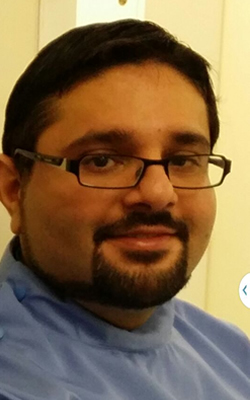How Important Are Baby Teeth?

Just because we will lose our first teeth doesn’t mean that we shouldn’t look after them, says Wickford dentist Dr Harminder Sehmi.
Baby teeth, milk teeth or even first teeth, call them what you will, but we will all have them and we will all lose them.
Because our first set of teeth are temporary, some parents may not be too worried about their children not looking after them as well as they should do. This is bad news all round, and, whilst it is true that we will all lose our first teeth, some of them can last us well into our teens and even beyond.
Baby teeth also have a purpose and, like the teeth that will follow, should be looked after correctly for a number of different reasons.
Ability to eat
As children switch from soft foods to eating harder foods, it is obvious that they will need their first teeth for eating. If these teeth are not looked after well and cause discomfort when eating, a child may be reluctant to eat some foods and this could result in a somewhat restricted diet. This could potentially even affect their growth and development.
Tooth decay
Yes, children will lose their first teeth but surely no parent wants to see their children in severe pain because their teeth have extensive decay. In fact, the number one reason for children to have hospital treatment is to have teeth extracted because of this problem. Because you couldn’t expect a young child, say of toddler age, to sit still to have a tooth extracted using a local anaesthetic, they have to be anaesthetised for this procedure and this can only be done in hospital. Although small, there are also additional risks when any medical procedure is performed using general anaesthesia. Making sure that they have regular six monthly examinations at the Cygnet Dental Practice will help to minimise the risk of decay, alongside good care at home.
Speech development
Try saying ‘the weather’ without touching your front teeth with your tongue. It is virtually impossible. If your child loses their front teeth prematurely, at an age when they are starting to learn a new vocabulary, this can affect their speech and could create problems that may stay with them for some time to come. This could even, potentially, affect their whole education and confidence in school, possibly making them reluctant to speak up in class.
Placeholders for adult teeth
Parents sometimes say that they aren’t worried that a child has prematurely lost a tooth as another one will be along soon. There are two issues with this argument. Firstly, if you lose a tooth prematurely, this does not speed up the arrival of the tooth that follows. In fact, your child might have a gap there for some time until the adult tooth starts to erupt. Secondly, and most importantly, a child’s first teeth act as placeholders for their adult teeth, allowing them to erupt correctly, helping your young child to have straight and even teeth. Where a tooth is lost prematurely, this may cause the secondary teeth to be crooked when they come through. This can then mean that the child will require orthodontic treatment to correct this.
How can parents help?
We all know that most children will only clean their teeth as quickly as they can get away with, and, if possible, not at all. Especially if they have a nice sweet taste in their mouth, why would they want to get rid of that? Of course, as adults, we know why, but children don’t.
However much it might be difficult to get your child to clean their teeth well, it is important that you do so. There are a number of ways which can help you to do this.
Educate
From a very early age, encourage your children to understand why it is important that they keep their teeth clean. Their are books and even videos, in child friendly language, that will help you to do this. Getting them to understand why it is important is at least half of the battle.
Make it fun
Let your child choose their favourite (appropriate) toothpaste and toothbrush. We recommend that you use an electric toothbrush as this will help more effective cleaning when young children are tired and can’t be bothered to brush.
Make it regular
Kids like routine, so try to get your child to clean their teeth at the same time each day. The last clean at night should always be right before bedtime. After brushing, nothing except for water should pass their lips until they wake up in the morning.
Supervise
Until you are absolutely sure that they are brushing their teeth well and correctly, always supervise their cleaning. Everyone should brush their teeth for at least two minutes. Children often have no sense of time though and once they can taste the toothpaste, they will probably stop brushing unless encouraged not to.
Floss
Admittedly, it might be difficult to get a child to floss between their teeth, but, if you can, this is great news and will help to avoid decay and gum problems. At least give it a try… you never know!
Diet
We all know how harmful sugar is to our teeth. Try to keep their consumption to a minimum and encourage them to eat as many ‘tooth friendly’ foods as possible. Avoid fizzy and fruit drinks as these cause enamel erosion. Stick to water wherever possible.
Make a dental appointment
Everyone should see a dentist every six months or so and children are no exception. We also recommend that they see the hygienist at the Cygnet Dental Practice too, as this is a great way to educate them in the best ways to keep their teeth healthy and to understand why they should do so.
You can make an appointment to see a children’s dentist at our Wickford dental practice by calling us today on 01268 733078.
